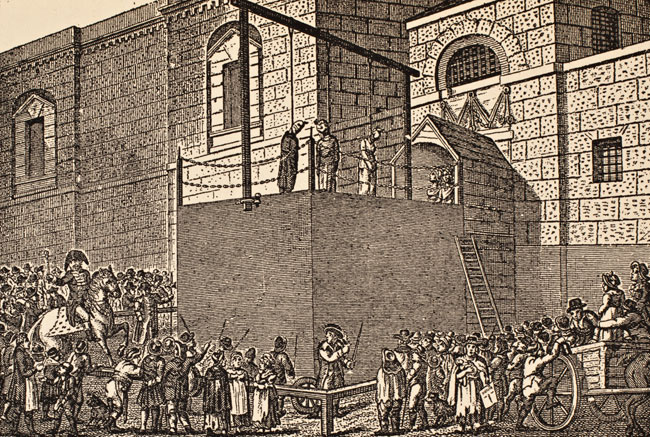
November 7, 2014, by Harry Cocks
The “Remarkable Trials” at Lancaster 1806, in Song
On 13 September 1806 three men from Warrington (which was then in Lancashire), Samuel Stockton, John Powell and Joseph Holland, were hanged on the scaffold outside Lancaster castle. They were part of a group of twenty-four men who had been arrested for sodomy and other homosexual offences the previous May, of whom nine were eventually tried. (Collectively, the summer assizes at Lancaster were known as the “Remarkable Trials”, thanks to a pamphlet of the same name published shortly afterwards). Two weeks later a Manchester artisan named Thomas Rix was executed at the same place along with the 69-year-old Isaac Hitchen, who kept the “infamous house” in Great Sankey, Cheshire, where the men met regularly. The original group contained men of differing classes, including artisans, waiters and publicans, as well as Robert Ball, a steward to a local landowner, a gentleman named Alexander Chorley and Joseph Holland, a pawnbroker said to be worth £40,000. The local press could only make sense of such a diverse group by referring to the egalitarian and secretive meetings of Freemasons, who had gained a strong foothold in the area at the end of the eighteenth century. The men were said to have met every Monday and Friday, and, like Freemasons, to have “accosted each other with the title ‘Brother’!” Rix had been initiated into this world in the 1780s by friends of his in Manchester, who loitered in the Exchange in the city centre where they could meet “this description of people.” Far from being seen as a separate world or subculture, these encounters were the casual consequence of masculine social life. Rix recalled that he had been ‘making water’ on the way home from the pub with a friend who then ‘came up to him and took hold of his yard,’ whereupon they had ‘used friction with each other till nature spent.’
Before the trials, Rix had tried to save himself from the gallows by giving the two investigating magistrates, Richard Gwylim and John Borron, a full confession and a detailed account of the goings on at Great Sankey. However, the magistrates, having encouraged Rix’s hopes of pardon, went back on the deal, having decided that he had not implicated enough people or provided enough evidence to permit further trials. Hitchen, on the other hand, and to his eternal credit, refused to co-operate with the magistrates, saying that he knew nothing about it and that the whole thing was “all French to him.”
The trials were written about in 2006 by me in a Past and Present article (see below), and now the house in Warrington and the grisly fate of Rix and the others has been memorialised in a song by the folk singer Eleanor Levin (see link below), as part of the “Documenting Dissent” project being run from Lancaster Castle devoted to recording the history of political and religious dissent in the area. Even though Hitchen, Rix and their confreres met an untimely end, they nevertheless live on in print and song.
Documenting Dissent
http://www.documentingdissent.org.uk/
The Song: “Isaac Hitchen’s House”, by Eleanor Levin
http://www.documentingdissent.org.uk/?p=15521
The article
Harry Cocks, “Safeguarding Civility: Sodomy, Class and Moral Reform in Early 19th Century England”, Past and Present 190 (February 2006), pp. 121-146.
http://past.oxfordjournals.org/content/190/1.toc
Picture top right is an execution outside Newgate Prison, early 19th century.

At the same assizes a relative of mine was transported to Australia for starting a strike in Liverpool. We now have family in Australia.
[…] Harry Cocks. An excellent summary of the “remarkable trials” of 1806. https://blogs.nottingham.ac.uk/historypastandpresent/2014/11/07/the-remarkable-trials-at-lancaster-1… […]